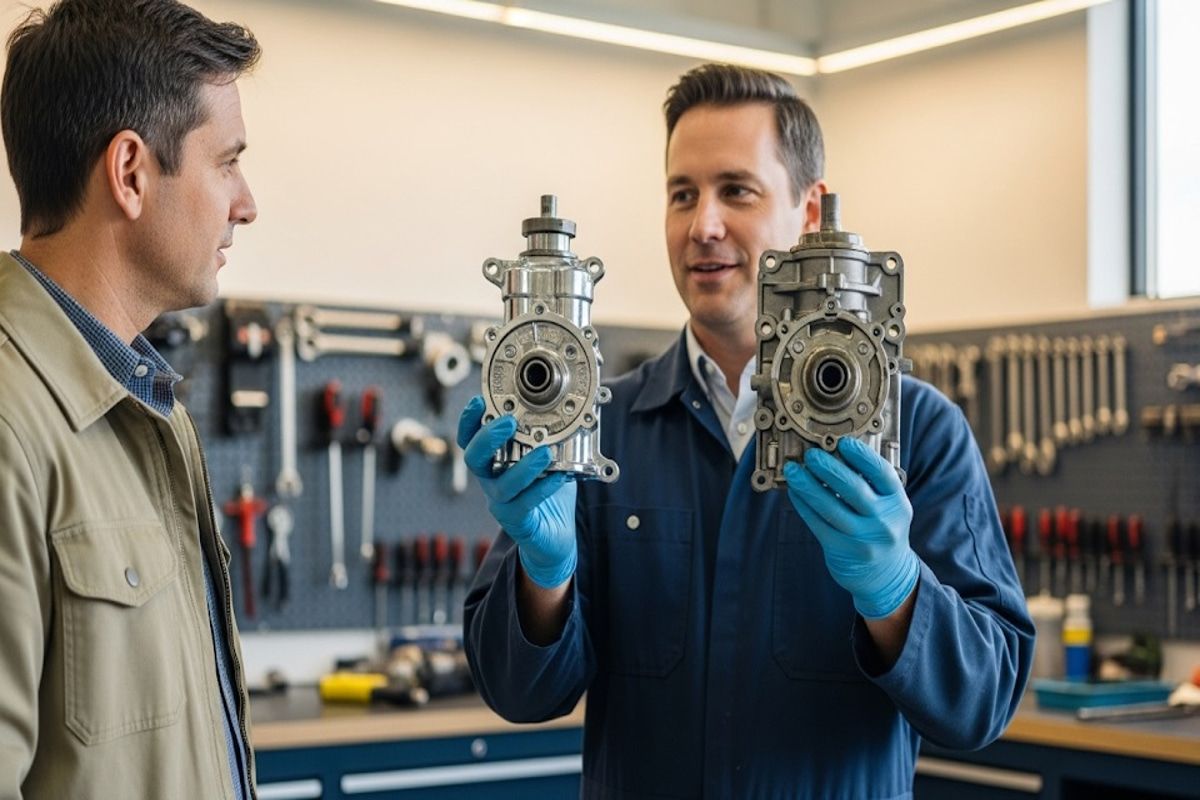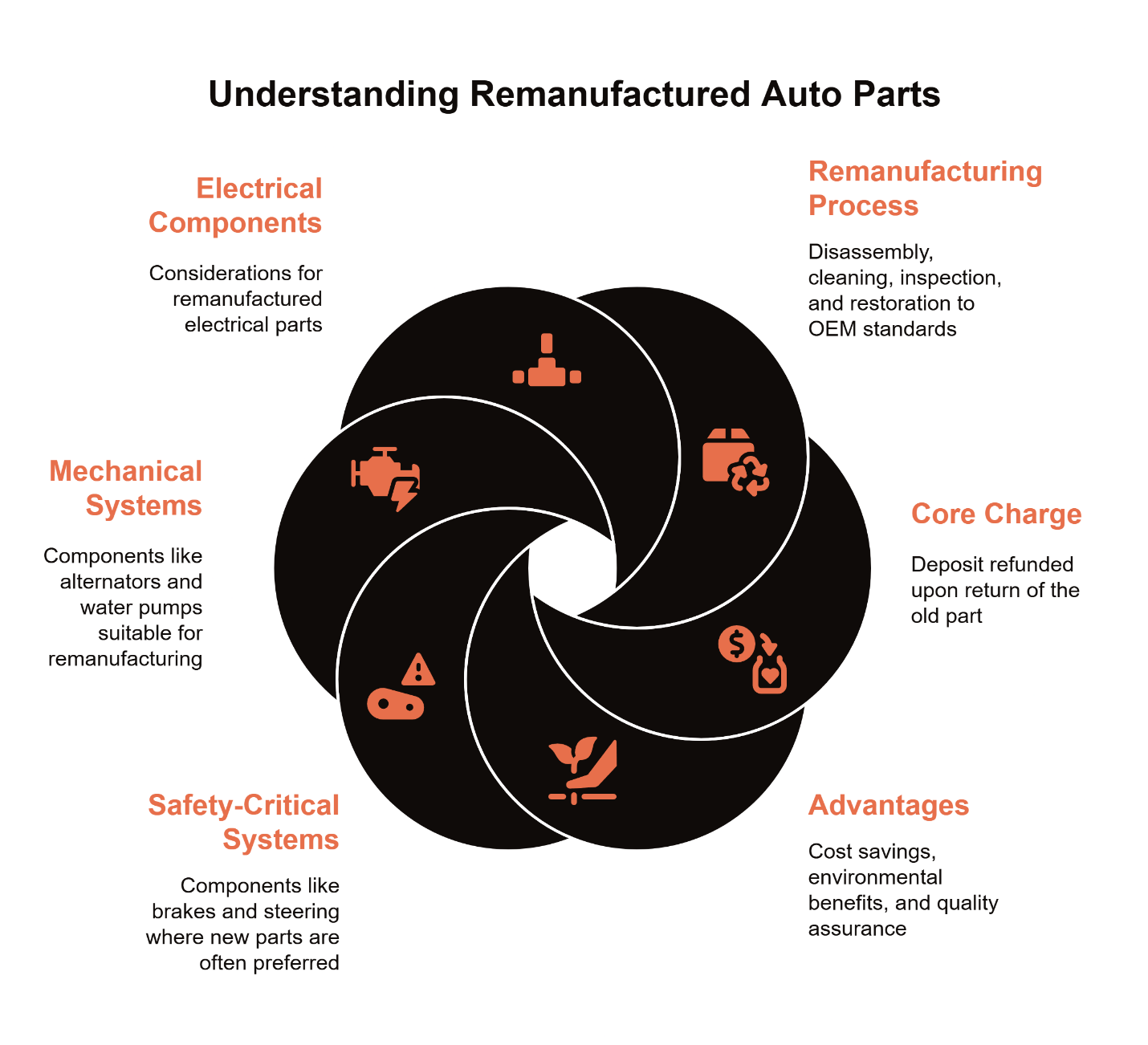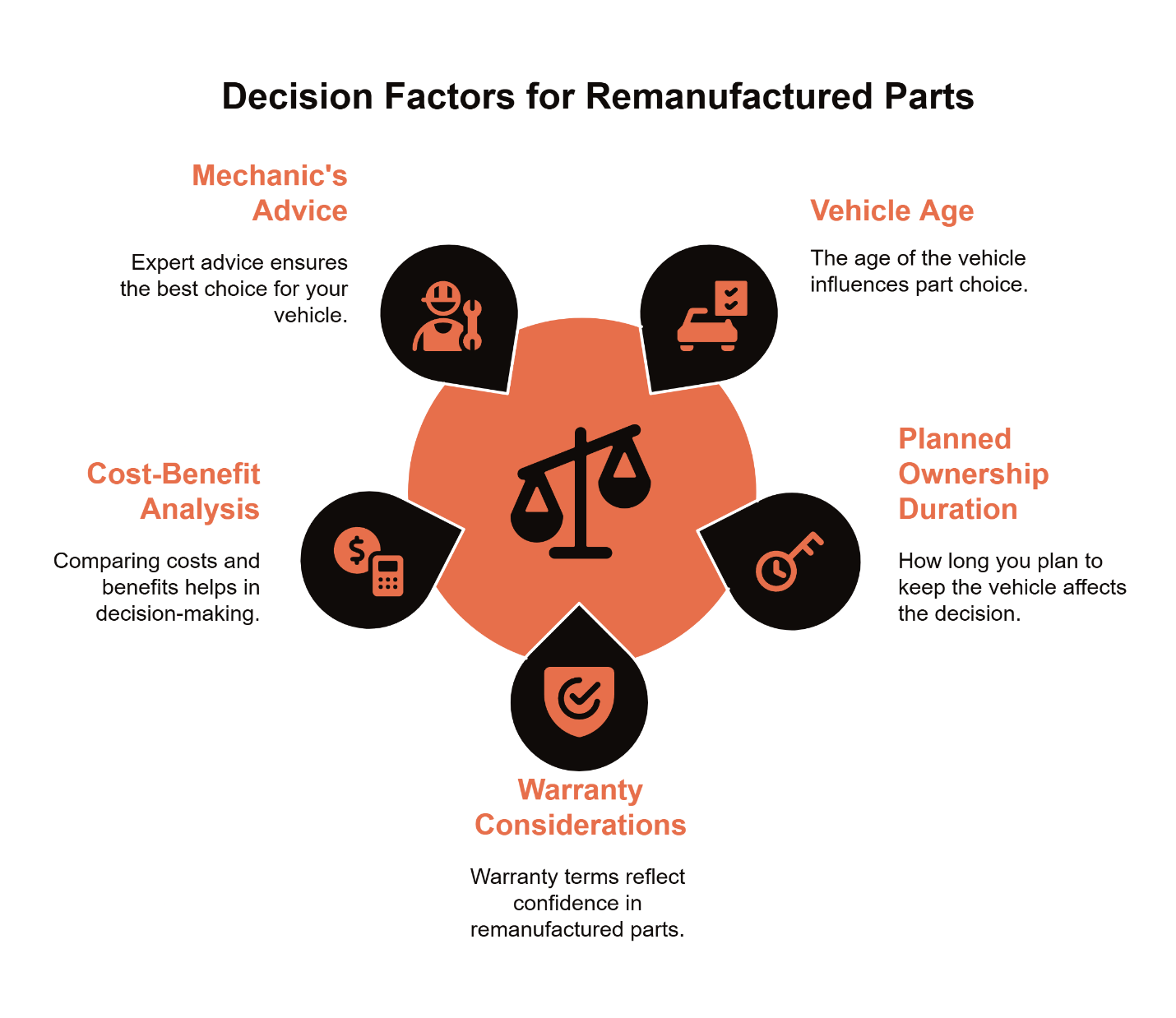
When to Consider Remanufactured Auto Repair Parts for Your Family Vehicle
Key Takeaways:
- Understanding Remanufactured Parts: Remanufactured auto parts undergo a standardized industrial process where all worn components are replaced to meet OEM specifications, making them different from merely used or refurbished parts.
- System-Based Decisions: Safety-critical systems (brakes, steering) may warrant new parts for peace of mind, while mechanical systems (alternators, water pumps) are typically excellent candidates for remanufactured options.
- Warranty Importance: Quality remanufactured parts often come with substantial warranties that indicate manufacturer confidence - always check warranty periods, mileage limits, and whether labor is covered.
- Vehicle-Specific Factors: Consider your vehicle's age, planned ownership duration, and remaining life expectancy when deciding between new and remanufactured parts for the best balance of value and reliability.
- Electrical Component Considerations: Look for thorough testing and strong warranties when choosing remanufactured electrical parts, as these systems present unique challenges in the remanufacturing process.
Making informed decisions about remanufactured parts requires considering both the vehicle system and your specific circumstances to balance cost savings with safety and reliability.
The financial impact of parts decisions over a vehicle's lifetime can be significant. When facing repair bills for your family vehicle, you've likely encountered the term "remanufactured parts" as a potential option. Understanding when these parts are appropriate versus when new parts are necessary can help you make informed decisions that balance cost savings with your family's safety and vehicle reliability. Many reputable auto repair in Yorba Linda shops can provide guidance on whether remanufactured parts are suitable for your specific situation.
Understanding Remanufactured Auto Parts

Remanufactured auto parts are fundamentally different from used or simply refurbished parts. A remanufactured part is typically a used OEM (Original Equipment Manufacturer) part that has been completely disassembled, cleaned, and inspected. The main housing or core (like an alternator casing, engine block, or transmission case) is typically reused after thorough inspection and necessary machining. The internal wearing components and critical functional parts are replaced or re-machined to meet OEM specifications.
Unlike used parts that come "as is" or rebuilt parts where only the obviously damaged components are replaced, remanufactured parts are held to higher standards. During remanufacturing, the process focuses on restoring the part to perform according to OEM tolerance, quality, and durability standards. This comprehensive process aims to restore the part to like-new functionality.
When purchasing remanufactured parts, you'll likely encounter something called a "core charge" or "core deposit." This is essentially a deposit you pay upfront when buying the remanufactured part, which is refunded when you return your old, failed part (the "core") to the supplier. For example, if you purchase a remanufactured alternator with a $50 core charge, you'll pay that amount in addition to the part's price. After installing the new part, you return your old alternator to the store, and they refund the $50 deposit. This system ensures a steady supply of cores for the remanufacturing process and encourages recycling of automotive parts.
Remanufacturing offers several advantages for value-conscious family vehicle owners:
- Potential cost savings compared to new replacement parts
- Environmental benefits as remanufacturing typically uses less energy than producing new parts
- Quality assurance with many remanufactured parts coming with warranties comparable to new parts
Vehicle Systems and Part Considerations
Not all vehicle systems are equally suitable for remanufactured parts. Understanding which systems can safely use remanufactured components is crucial for maintaining your family's safety while managing costs. Professional automotive repair technicians in Yorba Linda can provide guidance based on your specific vehicle make and model.
Safety-Critical Systems: When New Parts May Be Preferable
'Safety-critical' components are those which put you in immediate danger if they fail - including brakes, steering, and suspension systems. These components directly affect your ability to control your vehicle and prevent accidents.
For these critical systems, carefully evaluate whether remanufactured parts are appropriate. In many cases, new parts provide greater peace of mind, especially for:
- Brake system components (particularly master cylinders and calipers)
- Steering components (tie rods, rack and pinion assemblies)
- Some electronic safety systems
It's important to note that certain safety components have different remanufacturing suitability. For instance, airbags and their inflators are rarely remanufactured due to extreme safety concerns and liability issues, and are almost exclusively replaced with new OEM parts. On the other hand, ABS modules are commonly and successfully remanufactured by reputable companies.
When considering remanufactured parts for safety-critical systems, examine the reputation of the remanufacturer, warranty terms, and quality standards. High-quality remanufactured parts from reputable sources can provide performance comparable to new parts - but quality can vary significantly between manufacturers.
Mechanical Systems: Where Remanufactured Parts Often Perform Well
Many mechanical systems in your vehicle are excellent candidates for remanufactured parts, offering substantial cost savings with minimal risk when sourced from reputable suppliers:
- Alternators and starters
- Water pumps
- Power steering pumps
- A/C compressors
- Radiators
These components often undergo thorough remanufacturing processes that restore them to like-new performance while costing significantly less than new parts. Since they don't typically cause immediate safety concerns if they fail (though they may leave you stranded), they present a reasonable balance of cost versus risk.
Electrical Components: Special Considerations for Remanufactured Options
Electrical systems present unique challenges for remanufactured parts. Modern vehicles rely heavily on complex electronic components that control everything from engine performance to safety systems.
When considering remanufactured electrical components:
- Look for components that have undergone comprehensive testing
- Verify that all electronic parts have been tested under various operating conditions
- Check warranty terms, as longer warranties often indicate manufacturer confidence
- Consider your vehicle's age and how long you plan to keep it
Electronic control modules, sensors, and integrated circuits may be better purchased new, while larger electrical components like alternators and starters are typically excellent candidates for remanufactured options.
+-------------------------------------------------------------------------------------------------------+
💡 Quick Takeaways
- Quality Matters: Remanufactured parts undergo a standardized process where worn components are replaced to meet OEM specifications, though the main housing/core is typically reused.
- System Consideration: Safety-critical systems like brakes and steering may warrant new parts, while mechanical systems like alternators often do well with remanufactured options.
- Electrical Components: Look for thorough testing and strong warranties when choosing remanufactured electrical parts.
+-------------------------------------------------------------------------------------------------------+
Decision Factors for Family Vehicles

As a value-conscious family vehicle owner, several practical factors should guide your decision when considering remanufactured parts. Many car repair shops in Yorba Linda can help assess which parts would be suitable for your specific vehicle needs.
Vehicle Age and Planned Ownership Duration
The age of your vehicle and how long you plan to keep it are key considerations:
• For relatively newer vehicles you expect to keep long-term: New parts might be worth considering for systems you don't want to service again soon.
• For older vehicles with higher mileage: Remanufactured parts could offer a balance of quality and value, especially if you're maintaining the vehicle for several more years.
• For vehicles you plan to replace soon: Remanufactured parts can provide a cost-effective solution to keep your vehicle running reliably until you're ready for a replacement.
The sweet spot for remanufactured parts is often in that middle category - vehicles that still have substantial life left but aren't brand new.
Warranty Considerations for Remanufactured Parts
Warranty terms reveal much about a manufacturer's confidence in their remanufactured products. Quality remanufactured parts often come with warranties that may approach those of new parts.
When evaluating warranties:
- Compare the warranty period to new parts
- Look for mileage limits that align with your driving habits
- Check if labor is covered or just the part itself
- Understand where warranty service must be performed
Some local repair shops offer warranties on parts and labor, providing additional protection beyond the manufacturer's warranty.
Cost-Benefit Analysis Based on Your Specific Vehicle
The final decision should be based on a cost-benefit analysis specific to your family's situation:
- Compare the price difference between new and remanufactured options
- Factor in the labor costs (which are typically the same regardless of part type)
- Consider the inconvenience and potential safety implications if the part fails
- Evaluate the expected remaining life of your vehicle
Always discuss these options with your trusted mechanic. Their experience with specific vehicle models and part brands can be invaluable in making the best choice for your situation. A knowledgeable mechanic can advise on which remanufactured brands have proven reliable for your specific make and model, and which systems might warrant investing in new OEM parts instead.
For families balancing vehicle maintenance costs against other expenses, remanufactured parts can offer savings without compromising reliability when chosen wisely. Climate conditions can be demanding on vehicle systems, making quality particularly important regardless of whether you choose new or remanufactured parts.
+-------------------------------------------------------------------------------------------------------+
💡 Quick Takeaways
- Vehicle Timeline: Consider your vehicle's age and how long you plan to keep it when deciding between new and remanufactured parts.
- Warranty Protection: Quality remanufactured parts typically come with warranties that indicate manufacturer confidence.
- Mechanic Input: Your trusted mechanic's experience with specific vehicle models and parts brands can guide your decision-making process.
+-------------------------------------------------------------------------------------------------------+
Conclusion
Remanufactured auto parts can be an excellent option for family vehicles when chosen thoughtfully. By understanding which vehicle systems are appropriate for remanufactured parts, evaluating warranty terms carefully, and considering your specific vehicle's age and future, you can make informed decisions that maintain safety while maximizing value.
Always discuss these options with your trusted mechanic before making a final decision. Their hands-on experience with different brands and remanufacturers, combined with knowledge of your specific vehicle's history and condition, provides crucial context that can help you make the best choice. What works well in one vehicle might not be ideal for another, and a knowledgeable mechanic can help you navigate these nuances. When seeking auto repair in Yorba Linda, look for experienced professionals who can provide honest guidance about using remanufactured parts.
The next time your family vehicle needs repairs, you'll be equipped to have a more informed conversation with your repair shop about whether remanufactured parts are the right choice for your specific situation.
Frequently Asked Questions (FAQs)
Q: How do warranties compare between remanufactured and new auto parts?
A: Quality remanufactured parts typically come with warranties that may vary by manufacturer, while new OEM parts generally offer longer coverage periods. High-quality remanufactured parts can sometimes have warranties comparable to, or even exceeding, those of new aftermarket (non-OEM) parts. However, new OEM parts often carry robust, nationwide dealer-backed warranties, which may differ from both aftermarket new parts and remanufactured parts. The warranty length often reflects the manufacturer's confidence in the part's reliability and can be a good indicator of quality.
Q: What questions should I ask my repair shop about remanufactured parts?
A: Ask about the remanufacturer's reputation, the specific testing performed, warranty terms including labor coverage, and whether they've had good experiences with that particular brand for your specific vehicle model. Also ask which brands they personally trust and what their experience has been with various remanufactured parts on vehicles similar to yours.
Frequently Unasked Questions (FUQs)
Q: Why are some remanufactured parts sometimes more expensive than others?
A: Price differences typically reflect variations in the thoroughness of the remanufacturing process, quality of replacement components, testing protocols, and warranty terms. Higher-priced remanufactured parts usually undergo more rigorous quality control and testing.
Q: How do local driving conditions affect decisions about remanufactured parts?
A: Different climate conditions can place varying demands on cooling systems, air conditioning, and electrical components. This makes quality particularly important when selecting remanufactured parts for these systems, as they'll need to withstand environmental stresses.
Q: What exactly is a core charge and how does it work?
A: A core charge is a deposit added to the price of remanufactured parts that gets refunded when you return your old part. It encourages recycling and ensures manufacturers have a steady supply of cores to remanufacture. You'll pay this deposit upfront, then receive a refund when you return your old part in rebuildable condition, typically within 30 days of purchase.
🛠️ Ready to Make the Right Repair Choice?
At Orange Independent Auto Repair, we help families in Yorba Linda and nearby areas make smart, budget-conscious decisions—whether you're choosing between new or remanufactured parts. Our expert technicians specialize in European and classic vehicles, including Porsche, and are here to ensure safety and reliability with every repair.
📞 Call us at (714) 633-7161 to discuss your vehicle's needs or stop by for honest, professional advice.
Browse our website to learn more about how we can help keep your car running at its best.

